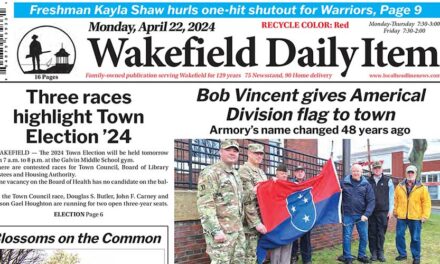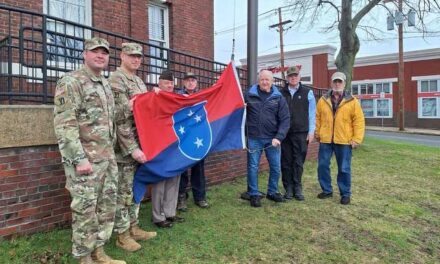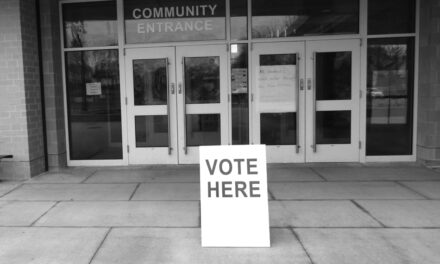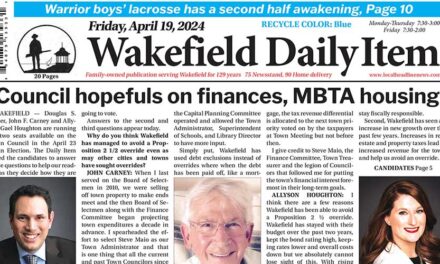Published in the February 28, 2017 edition.
By MARK SARDELLA
WAKEFIELD – In light of what many feel was a less than ideal law passed by initiative petition last November legalizing recreational marijuana in Massachusetts, the town will take a multi-pronged approach in its effort to keep any type of recreational marijuana businesses out of Wakefield.
In that November election, Wakefield voters bucked the state trend with a majority of local voters casting ballots against legalizing pot for recreational use.
“Nobody knows how to handle this,” Town Counsel Thomas
Mullen told the Board of Selectmen last night. “The state has been thrown into confusion by the vote at the polls last November authorizing legal marijuana.”
Mullen stressed that he was taking no position on the merits of legalizing marijuana for recreational use. But he did speak to the legal question of how a municipality can regulate or, if it so chooses, forbid recreational marijuana facilities.
“It’s anybody’s guess what this big piece of legislation means,” Mullen said.
Mullen pointed out that the law passed by referendum last
November would appear to allow municipalities to pass a zoning or other bylaw prohibit marijuana facilities by a vote at the polls. However, he questioned what it would mean to pass a zoning measure at the polls. By statute, he noted, zoning bylaws must be passed by Town meeting with a two-thirds majority.
He said that the law passed last November raises a number of as yet unanswered legal questions. Would a vote at the polls be seen as a directive to Town Meeting to pass such a zoning measure? Or would a General bylaw, which requires only a simple majority at Town Meeting be sufficient to prohibit marijuana facilities?
Mullen told the selectmen that he and Town Administrator Stephen P. Maio had discussed the matter at length.
“We think it prudent to take a belt and suspenders, highly conservative approach here to achieve what I understand to be the board’s objective,” Mullen said, “trying to keep recreational marijuana facilities out of Wakefield.”
Mullen recommended that the selectmen place on the April 25 Town Election ballot a question saying that the Town of Wakefield adopts, and authorizes Town Meeting to adopt, both a zoning bylaw and a general bylaw that forbids these marijuana establishments.
Assuming the voters approve the question at the polls, Mullen also recommended that the May 1 Town Meeting warrant include articles asking voters to adopt both the aforementioned zoning bylaw and the general bylaw prohibiting recreational marijuana facilities in Wakefield.
If the voters were to vote “No” in the referendum the Town Meeting articles would be moot, Mullen said. In case that happens, he recommended that the town have a third article on the warrant, invoking a temporary moratorium on marijuana establishments through 2018. The temporary moratorium, Mullen said, would give the town time to weight its options for next steps.
The latter may also come under the heading of a “belt and suspenders” approach, as the legislature has already delayed the opening of any retail recreational marijuana establishments statewide until July 2018.
The board voted unanimously to place the following two-part referendum question on the April 25 ballot:
• Shall the Town of Wakefield adopt, and shall the Wakefield Town Meeting be authorized to adopt, the following bylaw amendments:
“An amendment to the Zoning Bylaws adding as § 190-23.E the following: “The operation of any marijuana establishment, as defined in G.L. c. 94G, § 1, including, without limitation, a marijuana cultivator, marijuana testing facility, marijuana product manufacturer, marijuana retailer or any other type of licensed marijuana-related business, is prohibited in all zoning districts of the Town. This prohibition shall not apply to the sale, distribution or cultivation of marijuana for medical purposes licensed under Chapter 369 of the Acts of 2012.”
and
“An amendment to the General Bylaws adding as § 154-9, the following:
154-9. Marijuana Establishments Forbidden
The operation of any marijuana establishment, as defined in G.L. c. 94G, § 1, including, without limitation, a marijuana cultivator, marijuana testing facility, marijuana product manufacturer, marijuana retailer or any other type of licensed marijuana-related business, within the Town is prohibited. This prohibition shall not apply to the sale, distribution or cultivation of marijuana for medical purposes licensed under Chapter 369 of the Acts of 2012.”
The selectmen also approved the following Town Meeting articles for the Town Meeting warrant.
To see if the Town will vote to amend the Zoning Bylaws by adding as § 190-23.E the following:
“The operation of any marijuana establishment, as defined in G.L. c. 94G, § 1, including, without limitation, a marijuana cultivator, marijuana testing facility, marijuana product manufacturer, marijuana retailer or any other type of licensed marijuana-related business, is prohibited in all zoning districts of the Town. This prohibition shall not apply to the sale, distribution or cultivation of marijuana for medical purposes licensed under Chapter 369 of the Acts of 2012.”
and
“To see if the Town will vote to amend the General Bylaws by adding as § 154-9 the following:
“154-9. Marijuana Establishments Forbidden “The operation of any marijuana establishment, as defined in G.L. c. 94G, § 1, including, without limitation, a marijuana cultivator, marijuana testing facility, marijuana product manufacturer, marijuana retailer or any other type of licensed marijuana-related business, within the Town is prohibited. This prohibition shall not apply to the sale, distribution or cultivation of marijuana for medical purposes licensed under Chapter 369 of the Acts of 2012.”
To see if the Town will vote to amend the Zoning Bylaws by adding the following new article:
“ARTICLE XIX Temporary Moratorium on Marijuana Establishments
Ҥ 190-111. Purpose
“At the Massachusetts election held on November 8, 2016, the voters of the Commonwealth approved a new law which, among other things, established G.L. c. 94G, entitled ‘Regulation of the Use and Distribution of Marijuana Not Medically Prescribed.’
That statute permits ‘marijuana establishments’ to be licensed by a new Cannabis Control Commission (the ‘Commission’) throughout Massachusetts for the cultivation, testing, manufacture and sale of marijuana products. The Commission was initially to promulgate regulations concerning marijuana establishments by September 15, 2017, which date has been extended to March 15, 2018 by Chapter 351 of the Acts of 2016.
The regulation of recreational marijuana raises many complex questions concerning law, planning and public safety. The Town cannot adequately address those questions until the Commission issues its regulations. The purpose of this temporary moratorium is to provide the Town time for study, reflection and decision concerning the said regulations and the challenges posed by recreational marijuana.
Ҥ 190-112. Temporary Moratorium
“For the reasons set forth above and notwithstanding any other provision of the Zoning Bylaws to the contrary, the Town hereby adopts a temporary moratorium on the use of land or structures for a ‘marijuana establishment’ as defined in G.L. c. 94G, § 1. The moratorium shall be in effect through June 30, 2018. During the moratorium period, the Town shall undertake a planning process to address the potential impacts of recreational marijuana on the Town, consider the regulations to be issued by the Commission, determine whether the Town should ban any or all types of marijuana establishments within the Town, decide whether to prohibit on-site consumption of marijuana products at marijuana establishments, and otherwise weigh its options in addressing the issues raised by recreational marijuana.
Ҥ 190-113. Severability
“The provisions of this Section are severable. If any provision, paragraph, sub-section, sentence or clause hereof, or the application thereof to any person, establishment or circumstance, shall be held invalid or illegal, such invalidity or illegality shall not affect the other provisions hereof, or the application hereof to other persons, establishments or circumstances.”




